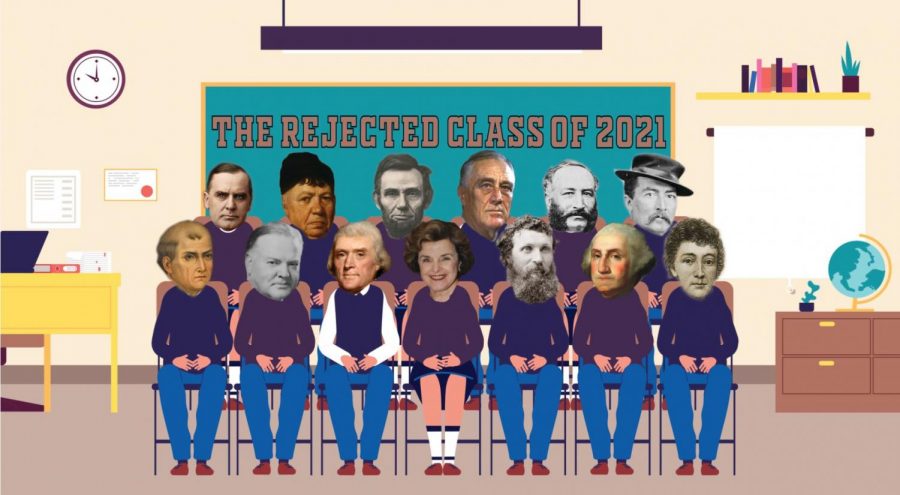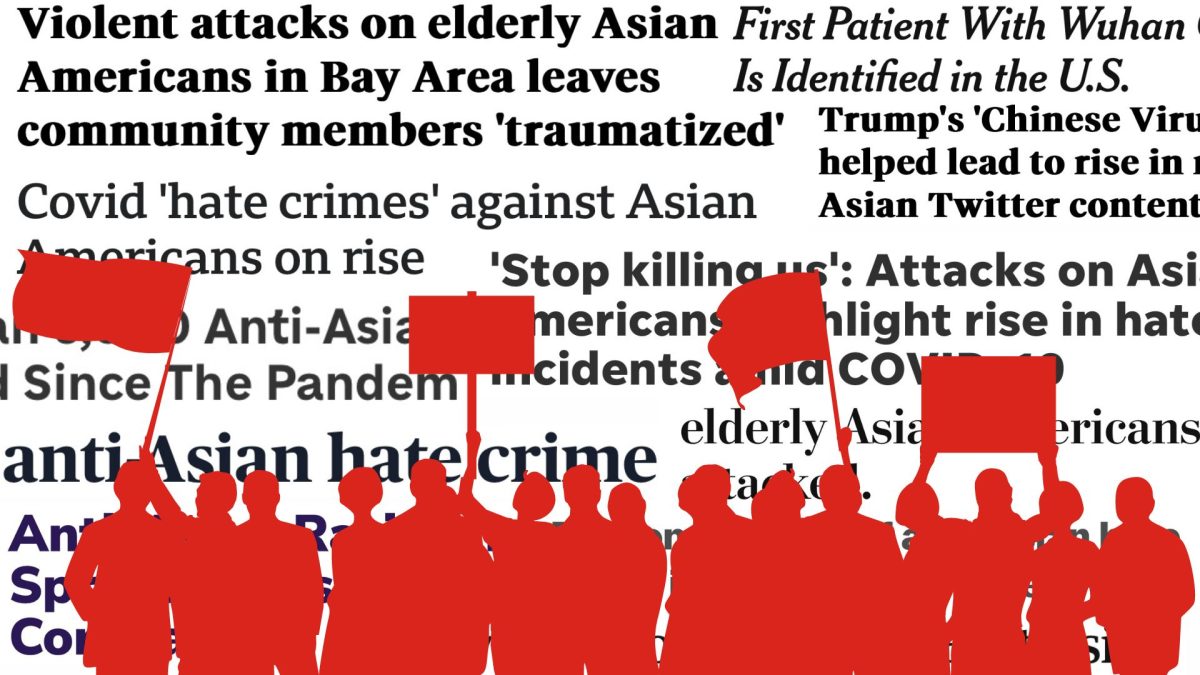Editor’s note: Scroll to the bottom of the article for more information regarding the figures in the visual.
The San Francisco Board of Education is currently on hiatus in its efforts to rename schools whose namesake figures are tied to oppression, racism, slavery and more, prioritizing getting students back into classrooms for in-person learning.
Gabriela López, president of the San Francisco school board, tweeted on Feb. 21 that reopening will be the board’s “only focus until our children and young people are back in schools,” while also adding that the board will be cancelling all committee meetings related to school renaming for the time being.
The move comes less than a month after the San Francisco Board of Education voted 6-1 in favor of renaming 44 of San Francisco Unified School District’s public schools, including schools with names of historic figures such as presidents Abraham Lincoln and George Washington. The board received scrutiny from many parties over the ruling; even Mayor London Breed criticized the board in an official statement released by her office on Jan. 27, the day after the decision.
“What I cannot understand is why the School Board is advancing a plan to have all these schools renamed by April, when there isn’t a plan to have our kids back in the classroom by then,” Breed said in the statement. “Our students are suffering, and we should be talking about getting them in classrooms, getting them mental health support, and getting them the resources they need in this challenging time.”
Our students are suffering, and we should be talking about getting them in classrooms, getting them mental health support, and getting them the resources they need in this challenging time.
— London Breed
Diane Garfield, placement coordinator at SF State’s Graduate College of Education and former SFUSD classroom teacher, stated that focusing on giving students “an equitable education, whether at home” or back in classrooms, should be prioritized by the school district. She described the decision to rename schools as “not all that important.”
“There are so many other issues that are paramount in the education of our children,” Garfield said.
Garfield believes that teaching the history of the figures in question would be more effective than simply changing the names of schools.
“I’m more in favor of education than just arbitrarily changing all the names,” Garfield said. “Let’s teach our students and teach everyone about these names.”
Families for San Francisco, a non-profit advocacy group focused on public education, economic prosperity and safety, criticized the board’s renaming decision in a January report.
The group cited that the board lacked objectivity while favoring “superficial” analysis, failed to consult the community or historians in the discussion and used research done through Google searches and Wikipedia as criteria for the decision that was made.
Seeyew Mo, executive director and founder of Families for San Francisco, said that while he agrees with the decision to rename schools, he disagrees with how the city’s school board went about it.
“In my opinion, they didn’t do it the right way,” Mo said. “I think this is a good educational moment. I don’t think you can dictate from above and from the top about what names are acceptable or not acceptable. I think it has to be a grassroots process.”
I want to make sure as many people as possible can see my statement about the board’s focus on reopening our schools. pic.twitter.com/8aJvMdNNPT
— Madam President, Gabriela López (@lopez4schools) February 22, 2021
Mo agrees that getting children back in schools, rather than school renaming, should be a top priority.
“Don’t let politics drive our priorities, but let real needs drive our priorities,” Mo said, “because I think we’re at a juncture in which a lot of people are suffering. If we put politics over people, then we’re not doing our job.”
On March 4, California lawmakers approved AB86, a bill that monetarily incentivises schools to reopen. Currently, the target date for schools to reopen under AB86 is March 31. SFUSD is tentatively set to have some of its schools reopen for in-person instruction starting on April 12.
“The reality is, we have a crisis right now and schools are closed,” Mo said. “I don’t see an argument in which we could sort of say that renaming is ever as important as reopening … you have people who can afford private schools and they’re opening. How about those kids that can’t go to private schools? That’s not equity.”
The SFUSD’s guiding principles for renaming are: “anyone directly involved in the colonization of people, slave owners or participants in enslavement, perpetuators of genocide or slavery, those who exploit workers/people, those who directly oppressed or abused women, children, queer or transgender people, those connected to any human rights or environmental abuses and those who are known racists and/or white supremacists and/or espoused racist beliefs.”
Some schools have clear guidelines on why they are set to be renamed, while some are not so clear. Here are some of the 44 schools whose names are being considered for renaming:
Front row, left-to-right:
Junípero Serra Elementary: Serra was considered a symbol of European colonialism and a perpetrator of the abuses faced by Native Americans in the 18th century. (no specific reasoning from the school is available)
Herbert Hoover Middle School: Hoover was accused of redlining and the general marginalization of Black Americans during his time as a U.S. politician. (no specific reasoning from the school is available)
(Thomas) Jefferson Elementary: One of the Founding Fathers of our country, Jefferson was a widely-known slave-owner. (no specific reasoning from the school or is available)
Dianne Feinstein Elementary: Former mayor of San Francisco, Feinstein is on the renaming hot seat due to her replacement of a vandalized Confederate flag hanging outside of City Hall during her time as mayor. (no specific reasoning from the school is available)
John Muir Elementary: Muir, among the world’s most famous naturalists, is criticized due to his alleged ties to the theft of Native American land. (no specific reasoning from the school is available)
George Washington High School: The first president of the United States, Washington was a prominent slave-owner and ordered the killings of Native Americans. (no specific reasoning from the school is available)
Francis Scott Key Elementary: Writer of “ The Star-Spangled Banner,” Key was a slave-owner. (no specific reasoning from the school is available)
Back row, left-to-right:
(William) McKinley Elementary: Former U.S. president, McKinley’s expansionist ideals are viewed as racist and discriminatory against Indigenous peoples. (no specific reasoning from the school is available)
(José de la Guerra y) Noriega Early Education School: Often considered a father of California and Californios, criticism toward Noriega is often tied to his involvement in the killings of Native Americans. (no specific reasoning from the school is available)
Abraham Lincoln High School: Among the most famous U.S. presidents, Lincoln is being criticized for his involvement in the killings of Native Americans. (no specific reasoning from the school is available)
(Franklin Delano) Roosevelt Middle School: FDR was the POTUS from 1933-1945; during this time, he allegedly turned down an anti-lynching bill proposed by his wife. Additionally, he was heavily involved in the internment of Japanese-Americans during World War II. (no specific reasoning from the school is available)
(Adolph) Sutro Elementary: Former mayor of San Francisco, Sutro is accused of denying the entry of African Americans into the Sutro Baths swimming complex, which, in the late 19th century, held Jim Crow policies.
(Philip) Sheridan Elementary: A Union general during the Civil War, Sheridan participated in the killings of Native Americans throughout his military career. (no specific reasoning from the school is available)









